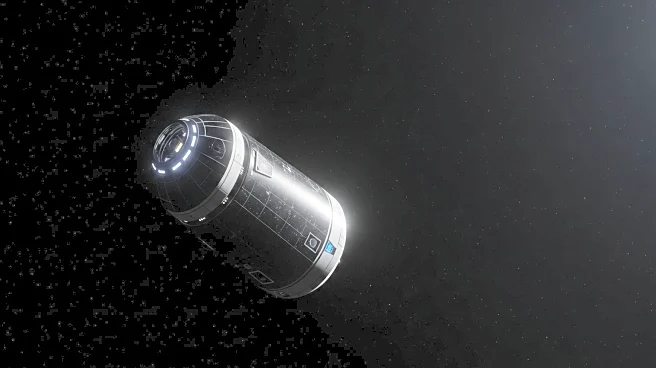What's Happening?
The Gemini VIII mission, launched by NASA, encountered a severe spinning issue that led to disorientation among the crew. The spacecraft began spinning at nearly one full revolution per second, creating a strobe effect as the sun's rays entered the capsule's windows. This rapid spinning made it difficult for the astronauts to operate the controls, and they feared the possibility of blacking out. The problem was initially unnoticed due to the lack of gravity and the capsule being on the dark side of the Earth, where the sun was not visible as a reference point. The spin was exacerbated after undocking from the Agena vehicle, which had been slowing the acceleration of the spin. Astronaut Neil Armstrong powered off the orbital thruster ring and used the larger retro rockets reserved for re-entry to stop the spin, effectively aborting the mission.
Why It's Important?
The incident highlights the challenges and risks associated with space exploration, particularly in the early stages of manned missions. The Gemini VIII mission was a critical test of NASA's ability to perform docking procedures in space, a necessary step for future lunar missions. The successful resolution of the spin issue by Armstrong demonstrates the importance of quick decision-making and technical expertise in crisis situations. This event underscores the need for robust safety protocols and contingency plans in space missions, influencing future designs and operational strategies for NASA and other space agencies.
What's Next?
Following the incident, NASA will likely conduct a thorough investigation to understand the cause of the thruster malfunction and implement measures to prevent similar occurrences in future missions. The agency may revise training protocols and spacecraft design to enhance safety and reliability. The lessons learned from Gemini VIII will contribute to the development of more advanced spacecraft and mission planning, paving the way for successful lunar and interplanetary exploration.
Beyond the Headlines
The Gemini VIII mission's challenges reflect broader themes in space exploration, such as the balance between technological advancement and human safety. The incident may prompt discussions on the ethical considerations of risking human lives in pursuit of scientific knowledge and exploration. Additionally, the mission's success in overcoming the spin issue could inspire confidence in the capabilities of astronauts and engineers, fostering public support for continued investment in space programs.









